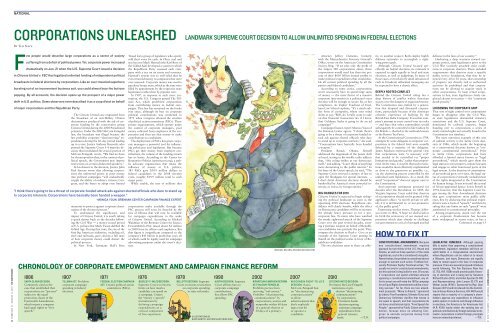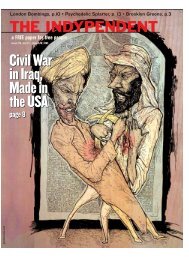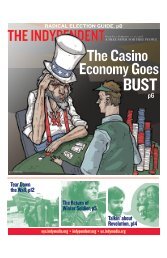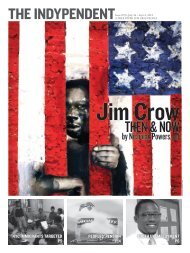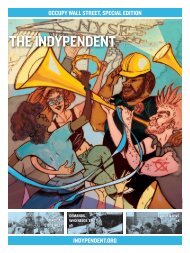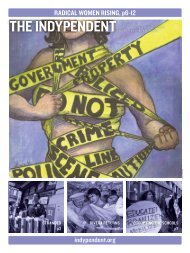Download Issue (pdf) - The Indypendent
Download Issue (pdf) - The Indypendent
Download Issue (pdf) - The Indypendent
Create successful ePaper yourself
Turn your PDF publications into a flip-book with our unique Google optimized e-Paper software.
National<br />
Corporations unleashed<br />
Landmark supreme court decision to alloW unlimited spending in Federal eleCtions<br />
By Ted Nace<br />
10 February 19 – March 11, 2010 <strong>The</strong> <strong>Indypendent</strong><br />
Few people would describe large corporations as a sector of society<br />
suffering from a deficit of political power. Yet, corporate power increased<br />
dramatically on Jan. 21 when the U.S. Supreme Court issued a decision<br />
in Citizens United v. FEC that legalized unlimited funding of independent political<br />
broadcasts in federal elections by corporations. Like an over-muscled superhero<br />
bursting out of an inconvenient business suit, you could almost hear the buttons<br />
popping. By all accounts, the decision opens up the prospect of a major power<br />
shift in U.S. politics. Some observers even described it as a coup d’etat on behalf<br />
of major corporations and the Republican Party.<br />
<strong>The</strong> Citizens United case originated from<br />
the broadcast of an anti-Hillary Clinton<br />
documentary produced with the aid of corporate<br />
funding by the conservative group<br />
Citizens United during the 2008 Presidential<br />
primaries. Under the 2002 McCain-Feingold<br />
law, the broadcast was illegal because the<br />
law prohibits corporate “electioneering” expenditures<br />
during the 60-day period leading<br />
up to a vote. Justice Anthony Kennedy, who<br />
penned the Supreme Court 5-4 majority decision<br />
that invalidated the crucial portion of<br />
McCain-Feingold, wrote, “We find no basis<br />
for the proposition that, in the context of political<br />
speech, the Government may impose<br />
restrictions on certain disfavored speakers.”<br />
In his dissent to the decision, Justice John<br />
Paul Stevens wrote that allowing corporations<br />
the unfettered power to pour money<br />
into political campaigns “will undoubtedly<br />
cripple the ability of ordinary citizens, Congress,<br />
and the States to adopt even limited<br />
measures to protect against corporate domination<br />
of the electoral process.”<br />
To understand the significance and<br />
impact of Citizens United, it is worth taking<br />
a quick detour back to the decades following<br />
the Civil War — a money-crazed period<br />
of U.S. politics that Mark Twain dubbed the<br />
Gilded Age. During that time, the rise of the<br />
first big American industries, including oil,<br />
steel and railroads, gave citizens a full taste<br />
of how corporate money could distort the<br />
political process.<br />
In New York, Tammany Hall’s Boss<br />
Tweed led a group of legislators who openly<br />
sold their votes for cash. In Ohio, coal and<br />
steel tycoon Mark Hannah (the Karl Rove of<br />
the Gilded Age) developed a system in which<br />
the Republican Party assessed each company<br />
with a tax on its assets and revenues.<br />
Hannah’s system was so well-oiled that he<br />
even returned money to companies that were<br />
over-assessed. Corporate money was used to<br />
purchase Senate seats, which at the time were<br />
filled by appointment by the respective state<br />
legislatures rather than by popular vote.<br />
In 1907, in response to such overt corruption,<br />
the U.S. Congress passed <strong>The</strong> Tillman<br />
Act, which prohibited corporations<br />
from contributing money to federal campaigns.<br />
That law has remained on the books<br />
ever since, although its ban on corporate<br />
political contributions was weakened in<br />
1971 when Congress allowed the creation<br />
of political action committees (Pacs). <strong>The</strong>se<br />
private organizations, which operate under<br />
the control of corporate managers, pool<br />
money collected from employees of the corporation<br />
and then use that money to make<br />
contributions to candidates.<br />
<strong>The</strong> deployment of Pacs has given corporate<br />
managers a powerful tool for influencing<br />
politicians and legislation. But because<br />
Pacs get their money from employee contributions,<br />
the volume of the funding stream<br />
has its limits. According to the Center for<br />
Responsive Politics (opensecrets.org), a public<br />
advocate organization that tracks the<br />
influence of money in U.S. politics,<br />
381 Pacs gave $39.9 million dollars to<br />
federal candidates in the 2008 election<br />
cycle, roughly $19.9 million total to each<br />
major party.<br />
While sizable, the tens of millions that<br />
“I think there’s going to be a threat of corporate-funded attack ads against elected officials who dare to stand up<br />
to corporate interests. Corporations have basically been handed a weapon.”<br />
~Monica YoUN, BRENNan CENtER CaMPaign finaNCE exPERt<br />
corporations make available through the<br />
Pac process will soon be dwarfed by the<br />
tens of billions that will now be available<br />
for campaign expenditures in the wake<br />
of Citizens United. According to Michael<br />
Waldman of the Brennan Center for Justice,<br />
ExxonMobil’s Pac raised about $1 million<br />
in 2008 from its officers and employees. But<br />
that figure is insignificant compared to the<br />
company’s $45 billion in profit that year, all<br />
of which could be legally used for campaign<br />
advertising purposes under the court’s decision.<br />
Chronology of Corporate Empowerment and Campaign Finance Reform<br />
1886 1907 1971 1976 1978 1990 2002 2007 2010<br />
Santa Clara decision.<br />
Commonly cited as the<br />
case that established that<br />
corporations are “persons”<br />
subject to the equal<br />
protection clause of the<br />
Fourteenth Amendment,<br />
which meant a company<br />
had equal rights to “free<br />
speech.”<br />
Tillman Act. Prohibits<br />
corporate campaign<br />
spending in federal<br />
elections.<br />
Federal Election Campaign<br />
aCt. Creates political action<br />
committees (Pacs).<br />
Buckley v. Valeo decision.<br />
Supreme Court overturns<br />
limits on how much a<br />
candidate can spend on<br />
a campaign. Creates<br />
the “money = speech”<br />
formulation by<br />
defining campaign<br />
expenditures as a<br />
critical component<br />
of free expression.<br />
Bellotti decision. Supreme<br />
Court overturns restrictions<br />
on corporate spending<br />
in state referenda.<br />
Austin decision. Supreme<br />
Court affirms ban on<br />
corporate campaign<br />
contributions,<br />
but allows Pac<br />
spending.<br />
illustrations by<br />
GARY MARTIN , antisocialstudies.COM<br />
Bipartisan Campaign Reform<br />
aCt (McCain-Feingold).<br />
Prohibits parties from<br />
receiving “soft money.”<br />
Prohibits “electioneering<br />
communications” by<br />
corporations, unions and<br />
nonprofits within 60 days<br />
of a general election or<br />
30 days of a primary.<br />
MICHAEL NELSON, michaelnelson.COM<br />
W i s c onsin R igh t-t o - L if e<br />
decision. Eases<br />
McCain-Feingold ban<br />
on “electioneering<br />
communications”<br />
to allow<br />
advertisements that<br />
don’t explicitly<br />
urge a vote for<br />
or against a<br />
candidate.<br />
Attorney Jeffrey Clements, formerly<br />
with the Massachusetts Attorney General’s<br />
Office, wrote on the American Constitution<br />
Society blog, “If we take only the profit of<br />
the largest 100 corporations alone, those<br />
corporations would need less than one percent<br />
of their $605 billion annual profits to<br />
make political expenditures that would double<br />
all current political spending by all the<br />
parties and federal candidates.”<br />
According to some critics, corporations<br />
won’t necessarily have to spend large sums<br />
of money — the mere threat of a massive<br />
corporate intervention in a politician’s next<br />
election will be enough to secure his or her<br />
compliance. As Zephyr Teachout of Fordham<br />
Law School explains, “It’s a much subtler<br />
form of corruption, where your mind<br />
shifts to say, ‘Well, do I really want to take<br />
on that financial transaction tax if I know<br />
that Goldman Sachs is going to do an ad<br />
campaign’”<br />
Campaign finance expert Monica Youn of<br />
the Brennan Center agrees. “I think there’s<br />
going to be a threat of corporate-funded attack<br />
ads against elected officials who dare<br />
to stand up to corporate interests,” she said.<br />
“Corporations have basically been handed<br />
a weapon.”<br />
President Barack Obama himself<br />
addressed the magnitude of the power shift<br />
at hand, stating in his weekly radio address<br />
that, “this ruling strikes at our democracy<br />
itself,” and adding, “I can’t think of anything<br />
more devastating to the public interest.” In<br />
his State of the Union speech, he said, “<strong>The</strong><br />
Supreme Court reversed a century of law to<br />
open the floodgates for special interests. …<br />
I don’t think American elections should be<br />
bankrolled by America’s most powerful interests,<br />
or worse, by foreign entities.”<br />
Citizens United decision.<br />
Overturns McCain-Feingold<br />
restrictions on preelection<br />
“electioneering<br />
communications”<br />
by corporations.<br />
Overturns Austin<br />
decision requiring<br />
corporate campaign<br />
expenditures from<br />
general treasury<br />
funds.<br />
—T.N.<br />
BIG CHANGES FOR 2010<br />
Citizens United is expected to begin reshaping<br />
the political landscape as soon as the<br />
upcoming 2010 elections. Republican candidates<br />
will clearly benefit, while the effect<br />
on Democratic candidates will be to increase<br />
the already heavy pressure to toe a procorporate<br />
line. To many who have watched<br />
the steady rightward march of the Supreme<br />
Court over the past several decades, creating<br />
a partisan weapon on behalf of Republican<br />
candidates was precisely the point. <strong>The</strong>y<br />
compare the decision to Bush v. Gore as an<br />
example of the Supreme Court putting its<br />
thumb on the political scales in favor of Republican<br />
candidates.<br />
<strong>The</strong> two decisions seem to share an affinity,<br />
in another respect: Both employ highly<br />
dubious rationales to accomplish a rightwing<br />
power grab.<br />
Although Citizens United focused specifically<br />
on federal elections, its rationale is<br />
expected to apply equally to local and state<br />
elections, as well as judgeships. In many of<br />
those cases, even relatively small infusions of<br />
cash to broadcast influential messaging can<br />
be expected to have a drastic effect.<br />
DEEPLY ROOTED CONFLICT<br />
Behind the Citizens United ruling lies a<br />
deep history of conflict within American<br />
society over the dangers of organized money.<br />
<strong>The</strong> Constitution was crafted by a generation<br />
that despised and distrusted corporations,<br />
particularly because of the American<br />
colonies’ experience of bullying by the<br />
British East India Company. It was that company’s<br />
attempt to exert control over tea sales<br />
— and fears that other commodities would<br />
subsequently be controlled in like fashion by<br />
the British — that led to the outbreak known<br />
as the Boston Tea Party.<br />
At the Constitutional Convention in 1789,<br />
attempts by some delegates to empower corporations<br />
at the federal level were soundly<br />
defeated by a majority of the delegates.<br />
James Madison expressed the general view<br />
that corporations were “a necessary evil”<br />
that needed to be controlled via “proper<br />
limitations and guards,” rather than empowered.<br />
At the time, it was felt that such restrictions<br />
would be most effectively implemented<br />
as close to the grassroots as possible, i.e.,<br />
via the chartering process controlled by the<br />
individual state legislatures. As a result, the<br />
word “corporation” does not appear once in<br />
the Constitution.<br />
Anti-corporate sentiments persisted for<br />
decades after the Revolution. In 1809, the<br />
Virginia Supreme Court ruled that charters<br />
of incorporation should not be granted if the<br />
applicant’s object “is merely private or selfish;<br />
if it is detrimental to, or not promotive<br />
of, the public good.”<br />
Expressing similar views, Thomas Jefferson<br />
wrote in 1816, “I hope we shall crush in<br />
its birth the aristocracy of our monied corporations<br />
which dare already to challenge<br />
our government to a trial of strength and bid<br />
HOW TO FIX IT<br />
CONSTITuTIONAL AmENDmENTS: Because<br />
any constitutional amendment requires<br />
approval by two-thirds of the U.S. House and<br />
Senate, as well as three-quarters of the state<br />
legislatures, such a fix is considered a longshot.<br />
Nevertheless, the problem is considered severe<br />
enough to warrant such action. Fordham University<br />
Professor Zephyr Teachout writes, “I’m<br />
usually not one for constitutional amendments,<br />
but this opinion [ruling] calls for one. Of course,<br />
if corporations can spend unlimited amounts<br />
opposing a constitutional amendment, any effort<br />
to enact one will make the 1970s campaign<br />
for an Equal Rights Amendment look like a stunning<br />
success.” So far, there are two amendment<br />
proposals. “Move to Amend,” sponsored<br />
by Liberty Tree Foundation, Ultimate Civics and<br />
Democracy Unlimited, clarifies that money is<br />
not equal to speech, and that corporations do<br />
not have constitutional rights. “Free Speech for<br />
People,” sponsored by Public Citizen and Voter<br />
Action, focuses more on allowing Congress<br />
to exclude corporate money from<br />
political campaigns.<br />
defiance to the laws of our country.”<br />
Harboring a deep wariness toward corporate<br />
power, state legislatures prior to the<br />
Civil War routinely attached strict conditions<br />
to corporate charters. <strong>The</strong>se included<br />
requirements that charters state a specific<br />
public service foundation, that they be renewed<br />
every 20 to 30 years, that ownership<br />
of property not directly tied to authorized<br />
activities be prohibited and that corporations<br />
not be allowed to acquire stock in<br />
other corporations. To keep errant corporations<br />
in line, state legislatures freely employed<br />
charter revocation — the “corporate<br />
death penalty.”<br />
LOOSENING THE CORPORATE GRIP<br />
That sort of tight control over corporations<br />
began to disappear after the Civil War,<br />
as state legislatures dismantled statutory<br />
restrictions and the U.S. Supreme Court,<br />
dominated by railroad interests, began<br />
handing over to corporations a series of<br />
newly minted rights not actually found in the<br />
Constitution (see timeline).<br />
<strong>The</strong> most notorious example of this sort<br />
of judicial activity is the Santa Clara decision<br />
of 1886, which marks the beginning<br />
of a controversial doctrine known as “corporate<br />
constitutional personhood.” Prior<br />
to Santa Clara, corporations had been<br />
afforded a limited status known as “legal<br />
personhood,” which merely gave them the<br />
legal status to own property, initiate lawsuits<br />
and engage in other functional parts of the<br />
legal system. As the doctrine of constitutional<br />
personhood grew over time, the legal status<br />
of corporations eventually included most<br />
of the rights designated in the Constitution<br />
for human beings. It was not until the arrival<br />
of Nixon-appointed Justice Lewis Powell in<br />
1974, however, that the Supreme Court began<br />
issuing the First Amendment decisions<br />
that gave corporations more public influence,<br />
first by declaring that political expenditures<br />
were a form of “speech,” and then by<br />
ruling that any limits on such “speech” were<br />
antithetical to constitutional principles.<br />
Among progressives, alarm over the rise<br />
of a corporate Frankenstein has become<br />
more widespread in recent years, as has a<br />
Continued on page 15<br />
LEGISLATIve RemEDIES: Although passing<br />
bills is easier than approving a constitutional<br />
amendment, legislative remedies still face an<br />
uphill battle in a Congressional environment<br />
where Republicans can be relied on to mount<br />
a filibuster, and many Democrats are equally<br />
likely to remain quiet in the face of corporate<br />
pressure. <strong>The</strong>re are several proposed initiatives<br />
worth following. <strong>The</strong> Fair Elections Now Act<br />
(S. 752, H.R. 1826) would provide public financing<br />
of elections and is being led by Senators<br />
Richard Durbin (D-IL) and Arlen Specter (D-PA)<br />
and Representatives John Larson (D-CT) and<br />
Walter Jones (R-NC). Sponsored by Rep. Alan<br />
Grayson (D-FL) and introduced into the Committee<br />
on House Finance Services, H.R. 4487 would<br />
require that a majority of a company’s shareholders<br />
approve any expenditure to influence<br />
public opinion. In order to curb foreign influence<br />
in elections, the America is for Americans Act<br />
(H.R. 4510) would widen the existing ban on<br />
political contributions by foreign nationals to domestic<br />
corporations in which foreign principals<br />
have an ownership interest.<br />
—T.N.<br />
<strong>The</strong> <strong>Indypendent</strong> February 19 – March 11, 2010 11


